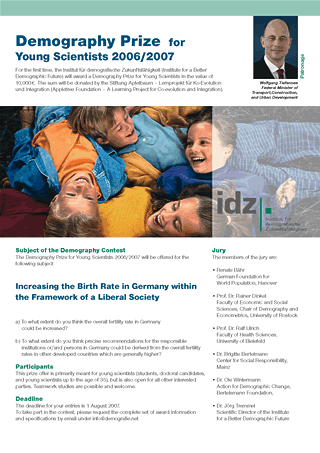Third Demography Prize for Young Researchers 2010/11
The third demography prize was dedicated to the following topic:
“Old majority – young minority: Where is a power shift between generations already visible and how can you balance it?”
For further information about the demography prize click here.
Abstract
Demographic change has long since become a reality – we are becoming fewer and older. According to the 2009 population projection presented by the German Federal Statistics Office, the German population will drop to 65 million people (today: 82 million) by 2060. One hundred people of working age will then have to provide for 60 pensioners. People over 65 will make up more than one third of the German population and only about 16% will be under 20. Today, the shares of people aged over 65 and under 20 are still about the same size.
In April 2008, the former German Federal President, Roman Herzog, already warned Germany of turning into a “pensioner democracy” in order to call attention to the set of problems connected to the nominally rising number of older voters. But are Western democracies actually likely to become “gerontocracies” preventing the young from having a say? Has demographic change already affected election results and campaigns?
Political parties may ask, as well, if and how the ageing process in society has by now affected their programmes and the staffing of party committees. Is there a need and is it even possible to counteract this trend?
The Institute for a Better Demographic Future awards the Demography Prize for Young Scientists every two years since 2007. The deadline for all entries was September 1st 2009. Also its second edition, 2008/2009, is characterized by the high quality of the replies: ten articles written by a total of 17 European authors are in the final round of the competition. It is also remarkable that the authors come from a great variety of scientific fields: ethnology, social sciences, political science, cultural management, economics, psychology, social pedagogy, philosophy, journalism, geography and business administration. The diversity of the articles thereby mirrors the interdisciplinary relevance of the topic. In addition to their overall quality, the papers feature new, innovative approaches and interdisciplinary research designs.
The jury has awarded three of the submitted articles.
The first place is shared by the following submissions:
“Opportunities and Possibilities for Young People in Shrinking Cities” by Felix Kroh and “Don’t Waste Your Youth” by Karsten Bär, Anja Erdmann and Corinna Hamann.
The article “Zachte G: a modern approach towards building networks for young people in a shrinking region“ by Maya Rocak and Maurice Hermans was chosen for a special award.
On March 5th 2010 the winners were honoured during the proceedings of a symposium where they were also given the opportunity to present their work.
You can find more information on the 2nd Demography Prize, as well as the awarded works, here (in German).
2006/07: Demography Prize: Increasing the Birth rate in Germany within the framework of a Liberal Society
In 2007, the Institut für demografische Zukunftsfähigkeit [Institute for a Better Demographic Future] will award the first Demography Prize for Young Scientists valued at €10,000 €. This money is donated by Stiftung Apfelbaum — Lernprojekt für Ko-Evolution und Integration [Appletree Foundation — A Learning Project for Co-evolution and Integration].

Aim of the competition
The Demographic prize for young scientists is an important contribution to improving public consciousness on demographic themes. The competition, the announcement of the winners and the eventual publication of the winning entries will all serve to expose people to themes that are important to the Institute for a Better Demographic Future (idz).
Questions for the 1st Demography Prize
a) To what extent do you think the overall fertility rate in Germany could be increased?
b) To what extent do you think precise recommendations for the responsible institutions and/or persons in Germany could be derived from the overall fertility rates in other developed countries which are generally higher?
The prize will encourage discussions about demographic change, give it a scientific base, and highlight different ways today’s decision-makers could deal with it. The idz would like to increase the numbers of dissertations and theses written on this subject by raising awareness of the theme at an early point in time.
The idea is that by writing a thesis on the subject, a lifelong interest in the topic is created. In France, every child knows the total fertility rate of the French population, in Germany however the demographic consciousness is underdeveloped. This is what needs to be changed.
Award ceremony
The awards ceremony took place on November 9, 2007 within the Symposium “Ways to More Children in Germany” at the Government Offices of Saxony in Berlin. If you are interested in the program of the ceremony, which took place within the Symposium “Ways to More Children in Germany” at the Government Offices of Saxony in Berlin


